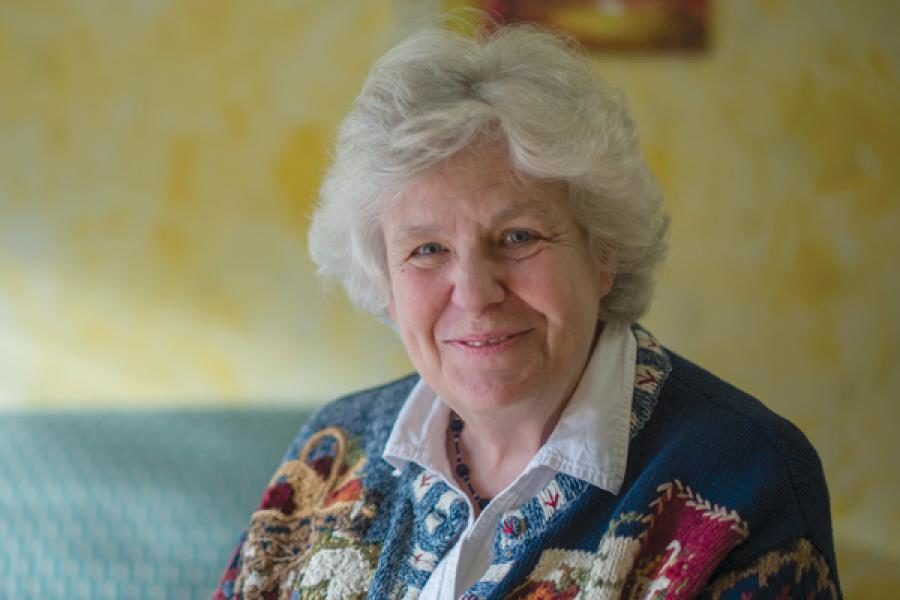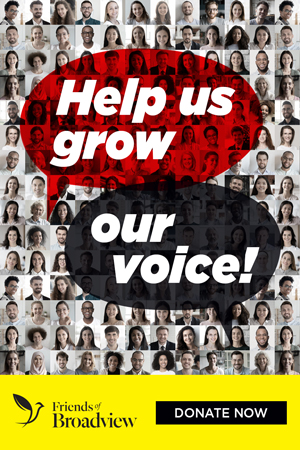Q When we met, in your course on the works of poet and author Wendell Berry, you spoke about the importance of committing to a place. What’s the place to which you’ve committed yourself?
A Here, Romero House. This community and these people. It’s profoundly shaped my view of the world, and my place in it, to live with people who are called refugees. Within that, it’s the little street I’ve lived on the last 25 years. It’s where I’ve had my best insights into the public life of this country.
When we first moved into this neighbourhood [in west Toronto], we were almost run out. It came to a head when a group of people went to city hall, saying we were running drugs and prostitution and that we were going to build 10-storey towers for peeping Toms to look down on the children. It was a really ugly “not in my backyard” attitude. It took almost seven years to get over that.
Now it’s reached the point where all of those neighbours know us, and we know them. They welcome the refugees, give them jobs, take them to school and introduce them to people. So in the process of living on this street and working through that terrible experience of rejection of the stranger, I was forced to reflect on what it is that holds us together. Because it’s not language, not religion, not culture, not history, and it’s not similar economic backgrounds.
And what I came to was a very simple insight: what we hold in common is the street. The street is the place that none of us owns but we all use, and we’re all responsible for it.
Being on that street provided an insight into something much more universal, which is what happens to us imaginatively when we’re really located. We see things that have implications way beyond a particular place. [The street] has taught me what the common good means, and how important it is politically, socially and for the church.
In medieval Europe, every village and town had a space called the commons that nobody owned, everybody used and everybody was responsible for. So when you talked about the commons, or the common good, they could smell it. It had a shape and a reality. Today there are some places like our street, including libraries and public broadcasting, that function in the same way. These are goods that we share but nobody owns — or shouldn’t own.
Q At an event last fall marking the 70th anniversary of the Canadian Council of Churches, you spoke about faith in the public square. You said that just as people have lost faith in the church, the church has lost faith in the public square. What did you mean by that?
A There’s a very predictable conversation about whether the church should have a privileged voice or no voice. This conversation has gone on for 30 or 40 years, and it’s almost boring. I also don’t think it’s where it’s at. The real issue now is that so many people — not just the church — have lost faith in the public square.
Q Are we tempted to say, “What’s the point of being there if no one’s listening?”
A When I was at the Catholic New Times [in the 1970s], everything the churches did was of interest. I spent at least half my time fielding calls from the Globe, the Star, CBC, CTV. People were very interested, and it was important.
But now — and I don’t want to blame a particular political party, because this has been going on for a while — what the churches say is not listened to. There are lots of great statements and occasionally a story, but it just isn’t listened to. We could say it’s the fault of the churches: they’re diminishing in numbers; they lack the power of persuasion or the power they used to have.
But I think it’s more. I’m very clear about this. It’s more that the present or more recent governments — majority governments — have treated all dissenting voices as irrelevant. They don’t need to listen to opposition parties; they don’t need to listen to NGOs, movements, groups, to other levels of government or to the churches. We’re one among many groups that are effectively ignored.
The public square as a place of discussion isn’t functioning.
Q But you’ve also spoken about the silencing of the churches by government. That doesn’t sound like being ignored.
A The biggest example is the chill around charitable status.
Q That’s not ignoring the church, is it?
A But it’s not just the churches. It’s any dissenting voice, to the point where there’s a lot of self-censorship. Lots.
It’s the combination of governments not listening while also setting the stage for people to censor themselves. The combination is a vast kind of silence — where the public square is basically empty.
Q So how might the church respond creatively, to re-enter the public square and embody hope?
A First we need to notice where the public square continues to function. Like the street. Like public broadcasting. There are spaces and places where significant care for the common good continues. Some cities, some provinces. Over and above that, what the churches have to bring is a sense of why it matters that [the public square] functions.
This is based on our faith in what we call the doctrine of creation, the biblical view that we are made to be together. We’re not lonely little individuals. We share a life together, and we share a world that we’re responsible for.
So in this time when — politically speaking — the public square isn’t working, part of our task is to recall why it has to work. Because that’s how we’re meant to be. That’s who we are at our best.
And having experienced being ignored and not listened to gives us a real solidarity with people who are ignored and not listened to. Maybe it’s a new call to be with people who are invisible and ignored. That’s where we’ll find our voice and say, “You have to listen to them.”
Q How can we be responsible for the world together?
A Boundaries of a country are formed for historical and political reasons. They’re not sacred, but what they can mark is the part of the world that we’re responsible for. This is our place that we don’t really own. This is our area of responsibility, which, in a time of climate change, is really important. This space of Earth is the good that we hold in common.
It’s only our actions that will give weight to our words. And in that I would include living happily. Have fun, enjoy. It doesn’t mean being the grim and guilty justice people.
Q That reminds me of your wonderful book Radical Gratitude. What are you grateful for these days?
A I’m just grateful to be alive. And I’m really grateful to be where I am now. I’ve been given a huge gift, to live with people called refugees.
Gratitude relies on a different sense of power. Having a sense of power for change, even in a small group, is really important. Otherwise you would just fold up.
An old Irish Sister of Mercy once said to me, “The only thing you should ever squander is money.” I said, “What?” She answered,“Yes, it’s only money. If you run out and you’re really up against it, you can always rob a bank.”
Her point was: never squander your life, because you’ll never get it back. I see so many groups paralyzed because they don’t have money. It’s only money.
You learn that from people who’ve lost everything. What’s left? They’re alive. They have that.
This interview has been condensed and edited.
This story originally appeared in the April 2015 issue of The Observer with the title “Interview with Mary Jo Leddy.”


Comments